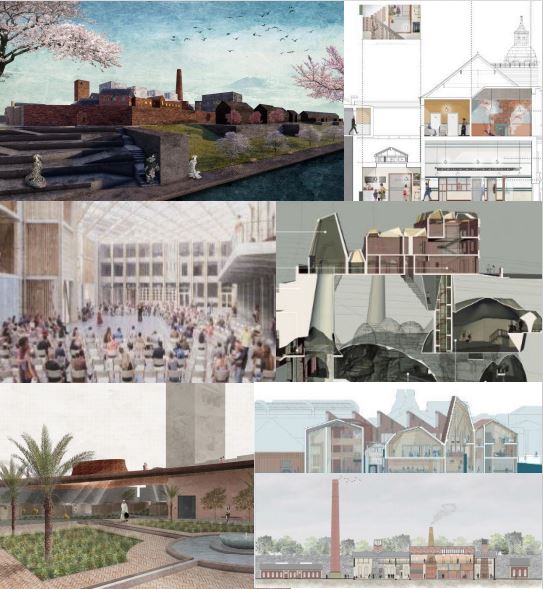Despite the disruption caused by Covid-19 to its format this year, the SPAB’s Philip Webb Award drew a record-breaking number of entries, with 31 schemes received from individuals or teams who, between them, represent 19 schools of architecture across the UK.
This student design competition sets architects in the early stages of their career a demanding dual brief: to devise a scheme which sympathetically revitalises a historic building of their choosing, which has decayed or been neglected, but which can be repaired and adapted for a sympathetic new use. Schemes need to incorporate both careful repair of existing fabric and a significant element of new work in a contemporary design. The number and quality of the entries this year meant the judges – architects Richard Griffiths, Sarah Khan and Kirstie Robbins, with Robert Davies – had an equally challenging (but very enjoyable) task before them in selecting a shortlist from among the wealth of thoughtful, imaginative, ambitious and beautifully presented work.
From schemes that repurposed industrial, institutional or commercial buildings to proposals that would gently breathe new life into ancient monuments, entrants demonstrated the huge potential benefits of opening up what had been closed and embracing what had been marginalised. In creating new spaces for learning, making, enjoying and exchanging ideas and skills – many bridging the analogue and digital worlds – entrants re-thought concepts such as ‘factory’, ‘education’ and ‘regeneration’. Many put community, inclusion, wellbeing and sustainability at the heart of their proposals, questioning conventional approaches of restoration or demolish-and-replace, to advance more creative solutions. A number of schemes tackled large sites: from manufacturing complexes, to whole streets or areas, even to a chain of locations spanning across a whole town or city. The judges were also impressed by entrants’ willingness to see value in, and a creative future for, even buildings that had fallen into advanced dereliction.
Having considered all the submissions anonymously against the published judging criteria, and following a lively debate, the judges selected seven schemes to explore in more depth with their designers at an assessment day on 3 November, which will be held online, given the continuing risk posed by the coronavirus pandemic. The winners will be announced later in the year.
The shortlisted schemes are:
Justin Chung (Manchester) – Islanded: a Reimagined Factory (Dana Prison, Shrewsbury)
Jess Tyson (Nottingham) – Principles of Continuity: Nottingham Arts Centre (Guildhall and Fire Station)
Emma Halford (Cardiff) – Navigation Colliery: Craft, Care & Conservation (Crumlin, South Wales)
Megan Peeks (UWE, Bristol) – Koutoubia Hammam, Marrakech, Morocco
Sarah Edwards (Sheffield) – Institute of Care: a test bed for conservation & repair (Longton, Stoke on Trent)
Shelby Green (De Montford, Leicester) – Caelatura: Long Stairs, Nottingham
Team entry (Birmingham City) – Moseley Road Baths, Balsall Heath, Birmingham by Rebecca Chim, Shannon Ciriaco, Frances Lacey, Annabel Linch, Huma Mahmood, Lechelle Ndlovu, James Timmins

